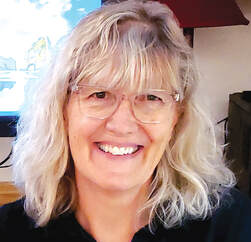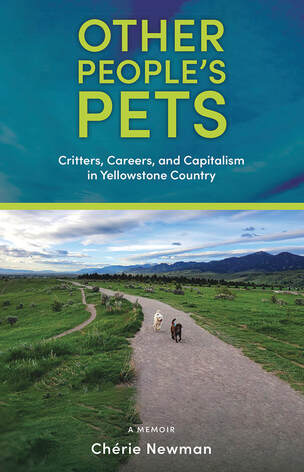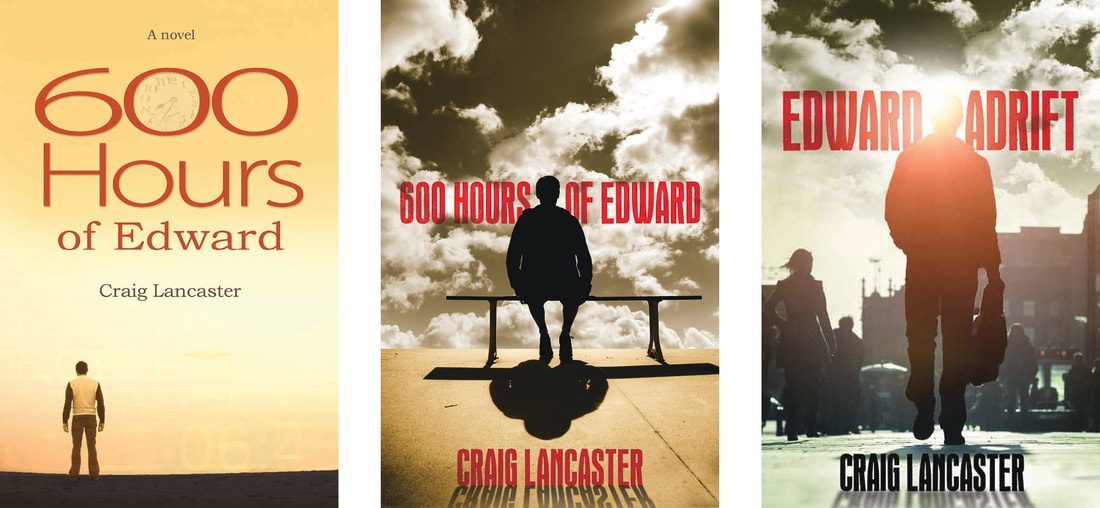|
3/2/2024 0 Comments Q&A: Chérie NewmanToday, it's my pleasure to host one of my all-time favorite human beings, Chérie Newman, as she answers some questions about her book Other People's Pets: Critters, Careers, and Capitalism in Yellowstone Country.  One of the things I like best about Chérie is how deeply she thinks about things, a tendency of hers that is written across her answers to my questions (and I promise, we're getting there soon). Then, of course, I'd have to consider the other things I like about Chérie, and the list grows. She has wide-ranging talents, she's a supportive pillar of the culture she exists in, and as I know from personal experience, she'll drive a few hours to see your play. (Well, maybe not yours. But mine. Thanks again, Chérie!) I've known her for going on two decades, and I'm continually impressed by the breadth of what she dips into and becomes proficient at doing. Without further ado, then, here's Chérie Newman and her thoughts about Other People's Pets...  I'm fascinated with the resumption of your—not career, really, but work—as a pet sitter after a long break from it. What prompted that? Was it like riding a bike, as the saying goes, or were there rigors to the second go-round you didn't anticipate? The resumption of my work as a pet sitter happened during the height of the COVID-19 pandemic. Before March of 2020, I earned most of my freelance income as a podcast editor, working with audio files recorded during live events. Then, suddenly, there were no live events. No live events meant no money for me. My hasty reaction to the loss of income was to accept a job as an office manager. Yuck!! I do not like office work. So, I quit that after a year and agreed to become a subcontractor for a Bozeman pet sitter who had way more work than she could handle. This was the end of 2021, when many people were starting to travel again. She started sending me on interviews and that’s when the fun began. Although, I’ve taken care of other people’s pets all my life, it was mostly for friends and family. Right now, I can only think of four or five people—“clients”—who hired me as a professional, home-stay pet sitter between 1990 and 2022. The rigors, as you say, of these new situations were complicated and multi-faceted. Most of the people I worked for were nice. But they weren't paying a lot, and their expectations were high. And, I have to say, that even though they were paying me two or three times the amount I’d earned before, the average hourly rate came out to about $4 an hour. Four dollars an hour for being on duty 24/7 is not great. Especially when you factor in responsibilities for other people’s property, package delivery (Why do people order stuff when they know they’re leaving town?), invisible fences that fail and other high-stress events, and the fact that most of the houses were located far from central Bozeman. The $4/hr didn’t include fuel and other travel expenses. It didn’t include travel expenses incurred when I drove 30 miles for an interview. At what point did you realize you were gathering book-worthy material? When my friends started yelling, “You have to write a book about this!” every time I told stories about my experiences at dinner parties. I love how the book uses something as seemingly picayune as pet sitting to explore much deeper themes about where we live and how. What are the big takeaways for you regarding our relationships with our animals and the places we call home? Well, first let me say that I’ve noticed a trend: pets are now treated more as children than animals. The love-of-my-life dog, MooJee, lived with me for 15 years, but I never considered her my child. She was a beloved companion and, of course, I did everything I could to keep her happy and safe. She was dependent on me for that. But. She. Was. A. Dog. During my recent pet sitting adventures I noticed an increase in bad pet behavior. Lots of neurotic animals, made so, I believe, by their people. For example, I took care of two Irish setters whose daily schedule included cocktail weenies at 4:30 p.m. and an 8 o’clock bedtime. They also expected their lunch at 2 p.m. and acted out if it wasn’t served on time. By acting out I mean behavior such as opening the freezer and letting food thaw or dragging kitchen scraps out of the sink and throwing them all over the floor or hiding car keys under a dog bed. The places we (some of us, anyway) call home seem to be much more temporary than they were in the past. And people who have more than one house/home often leave their animals with a pet sitter while they live somewhere else for long periods of time or take pets with them and leave their houses empty. I wonder about all the huge, often uninhabited houses standing on Montana land, places that used to support wildlife, land upon which wildlife can no longer migrate or find food. What have you learned about humans through their pets? I’ve noticed an increase in the human need for external approval, which some people try to extract from their pets. Kind of crazy. Pet pics on social media attract lots of attention, which offers online validation for people. But of course, pet pictures and stories are entertaining and fun. We can’t safely post images of children online these days. Maybe our pets are stand-ins? And then there’s the amount of money people in the U. S. spend on their pets—nearly 150 billion dollars in 2023, according to Market Watch. So, your question is insightful. Are humans devolving as the status of pets rises? Are pets usurping control of our behavior and finances? What's next for you (wide-open question; I'm talking books, music, vocation, avocation, etc., etc.)? Ha! Thanks for asking. My mind is always blazing with new ideas. I just published another book, Do It in the Kitchen: a step-by-step guide to recording your life stories (or someone else’s). When they find out I’m an audio producer, people often ask me questions about recording audiobooks and oral histories, or want to know how to create a podcast. This book will help anyone who has those kinds of urges. I just finished writing a children’s book about a dog who saves his family from a house fire (true story). The process of finding an illustrator has been, well…interesting. I wish I had better drawing skills. (But maybe not because then I’d draw and I have too much other stuff to do.) My list of podcast clients has grown again during the past few months, so I do that editing/production work as it comes in. I’m also a musician and play in a band called Ukephoria Montana. We perform public and private concerts and participate in twice-monthly sing-along sessions at the Gallatin Rest Home. I participate in a songwriting collaborative and write songs on my own, as well. Every so often, I land a public speaking or workshop facilitator gig. I can’t name names, but I’m talking with an educational group about the possibility of producing a podcast series for them. It would be a dream gig for me. All fingers crossed, please. Since I’m self-employed, the marketing and PR tasks are endless. There’s always something new to learn. And, oh yeah, I read a lot of books and listen to several audiobooks a week. Yep, a week. Recent favorites:
What am I missing? What else would you like to say?
Oh, you are a brave man. I always have something else to say and usually say way too much. But I’ll stop now, except for this and this:
Wait! One more thing: Thank you for these questions and for reading my book. Oh, and another thing: I’m champing (yes, champing — to more precisely convey “impatience” — not chomping) at the bit to talk with you about your new novel, Dreaming Northward. Okay, that’s all my things. Maybe. But you should stop reading now.
0 Comments
5/19/2023 2 Comments Hey, Craig, I Have a Question ...Welcome to the first installment of what I hope can become an occasional series here: You pose a question, and I answer it. Today's question came unprompted from a Facebook friend, and the answer illuminates an interesting little side story to the Edward series of books. Let's dig in: Q: I started reading 600 Hours of Edward yesterday, and in one edition I have he mentions the Billings Gazette, but in another it's the Billings Herald-Gleaner. Since this is a rare occasion when I can ask an author a question I have about a book when I have it, why is that? I don't know that I've ever addressed this in a wide-open public forum before. To grasp what happened here, we must go back to the writing of 600 Hours of Edward. That's a long time ago (late 2008) and far, far away. (OK, not really. I wrote that book about five miles from where I sit right now.) In late 2008, when I was writing the first draft of 600 Hours, I was working nights at the Billings Gazette as a copy editor. I saw no problem with using the actual name of the paper in the manuscript. The paper was a small part of the story, and the invocation of the paper's name was benign. Nobody got impugned. Also, at that point, I had no way of knowing that this one story I was sort of writing on a lark would ever be published. The idea that it might someday grow into what it became, spawning two subsequent novels, would have been preposterous to allow into my head. So ... let's fast-forward to 2012 ... 600 Hours has been out for a few years, and quite unexpectedly, it has become a little underground success story. It hasn't sold many copies, but it has received a couple of nice awards and some good press. The original publisher, a small press here in Montana, has decided to sell the publication rights to a much larger publisher with an international footprint. This larger concern acquires those rights with the idea that it will release a brand-new version of the book in August 2012, followed by the sequel, Edward Adrift, in 2013.
Edward Adrift, as I don't have to tell anyone who's read it, features the Billings newspaper as a much bigger plot player. And the references are far less complimentary. My problem: At this point, I still work at the Billings newspaper. Not good. Not comfortable. So I reach out to my new publisher with a suggestion: How about we change the name of the newspaper in the original story to something entirely fictitious (that right there is what we call plausible deniability!) and carry that new name through the sequel? Thus was born the Billings Herald-Gleaner (because if you're going to put a fake name on your newspaper, make it a funny one). I did realize we would leave some readers confused, but frankly, it's a pretty small number. I think the original version of 600 Hours of Edward sold fewer than 1,000 copies, and the 2012 re-release has sold upward of 200,000 across all of the languages in which it appears. For the vast preponderance of readers of the Edward books, the newspaper is and has always been the Billings Herald-Gleaner, not the Billings Gazette. Meanwhile, changing the newspaper's name meant I could continue to go to work without fear of having insulted my employer in a way that would have harmed either of us. A couple of final takeaways: My career at that newspaper ended just a few months after Edward Adrift was released, so I don't think changing the name of the paper in the book had any real effect, other than making me feel better about things. But there's a larger lesson here, one I've applied in the writing of subsequent books: It's fiction, so why not be fictitious? Business names, particularly, tend to be transient anyway. In an odd way, a piece of fiction can remain a lot more timely with invented references than it can with references to real-life things that might not survive a shift in fortunes or consumer habits. |
About CraigCraig Lancaster is an author, an editor, a publication designer, a layabout, a largely frustrated Dallas Mavericks fan, an eater of breakfast, a dreamer of dreams, a husband, a brother, a son, an uncle. And most of all, a man who values a T-shirt. Archives
July 2024
By categoryAll 600 Hours Of Edward And It Will Be A Beautiful Life Awards Books Bookstores Community Connection Craft Craig Reads The Classics Dreaming Northward Education Edward Adrift Family Geography History Libraries Memory Montana NaNoWriMo Northward Dreams People Plays Poetry Public Policy Q&A Social Media Sports Stage Texas The Fallow Season Of Hugo Hunter The Summer Son This Is What I Want Time Travel Work Writers Writing Archives
July 2024
|

 RSS Feed
RSS Feed